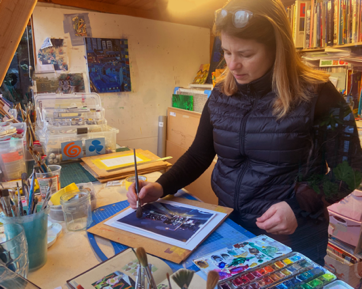Class details
Explore Watercolour through the V&A collection is a four week course. We draw inspiration from the artwork and objects on display and those held within the museum’s collection and archives.
The aim of this course will be to learn old and new techniques by focusing on the ways in which artists use this most luminous and versatile of mediums to record their world.
Tuesdays
2 – 4.30pm
8 – 29 June
Course Fee: £80 Adults (£60 Concessions)
Pay As You Go Fee: £20 Adults (£15 Concessions)
Limited to 10 artists
The V&A is one of the world’s leading museums of art and design. It has a permanent collection of over 2.3 million objects that span over 5,000 years of human creativity. The museum is opening again to visitors on 19th May and we hope you have an opportunity to book a visit to see some of the new displays. You can also take advantage of their excellent online resources which show the collections’ highlights and detailed research about the artists and their work.
Join us as we start our exploration of watercolour through the V&A over the next four weeks.
Course Content
Week 1: Renaissance Watercolour
This current display presents for the first time watercolour during the Renaissance as a unified art form, highlighting its versatility and pivotal role in understanding, interpreting and
documenting the natural world. In essence, we are looking back to be able to go forwards in our own artistic practice.
We will focus on the beautiful album of 59 delicate paintings of natural forms by Jacques Le Moyne de Morgues 1533-88. This one is his ‘Pomegranate’. We chosen this image to compare it with the YouTube clip of botanical artist Lucy T Smith painting the same fruit.

Week 2: The Watercolour Collection
This eclectic collection, includes both British and European works ranging from the 16th century to the 20th century, is particularly strong in well-known British artists such as John Sell Cotman, Turner, Constable, William Blake and Samuel Palmer . It also reveals how taste has changed in the use and appreciation of the medium.

Week 3: Recording Britain (then & now)
Recording Britain was an artistic documentary project compiled as the country was facing the impact of the Second World War. The resulting collection of more than 1500 watercolours and drawings, by artists such as John Piper, Michael Rothenstein, Barbara Jones and Stanley Badmin, is a rich visual record of buildings, landscapes and livelihoods under threat. We look at some of the highlights of this archive and paint our own record and recollections of the recent pandemic.

Week 4: New British Post War Designers
We will look at colour and Post war design for the last week. Althea McNish (1924 – 2020) was amongst the first, if not the first, designer of African-Caribbean descent to achieve international recognition. Her designs injected much-needed colour and life into the post-war fashion and textiles industry from the 1950’s onward.

Materials
You will need to supply your own materials for this course. We recommend:
- Watercolour paints (solid pans)
- Watercolour pencils
- Brushes (various shapes round/flat/mop and sizes ranging from 4, 6, 8,10 and 12)
- Watercolour paper
- Watercolour sketchbook
- 1 x Palette
- 2 x Water Jars
- 1 x Apron
Join us and explore watercolour through the V&A collection.
About the Tutor
Gail Astbury has a B.A. (Hons) Fine Art Painting from Wimbledon UAL and an MA in Contemporary Arts Practice from Goldsmiths University and Tate Galleries. Her work has featured in many prominent locations such as London’s Trafalgar Square, the Royal Albert Hall and the Royal Academy and she has works held in the collection of the MMSU Museum of Modern Art in Croatia.
Gail makes work in her studios in London and La Péruse, southwest France. Her work starts with her immediate surroundings, taking photos, sketching and amassing a picture library to use as reference points. Then she plays with the imagery, using scale, colour, edits and zoom to select and highlight interesting focal points. She uses a range of techniques to create paintings that are celebratory. They tell visual tales and proclaim societal hopes and fears. http://www.gailastbury.com
